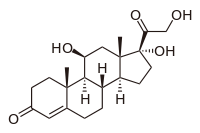
Photo from wikipedia
Prenatal androgen excess is considered one of the main causes of the development of polycystic ovary syndrome. In this study, we investigated the effect of prenatal hyperandrogenization (PH) on the… Click to show full abstract
Prenatal androgen excess is considered one of the main causes of the development of polycystic ovary syndrome. In this study, we investigated the effect of prenatal hyperandrogenization (PH) on the physiology of the adult uterine tissue using a murine model of fetal programming caused by androgen excess in adult female rats. Pregnant rats were hyperandrogenized with testosterone and female offspring were studied when adult. Our results showed that PH leads to hyperglycemia and hyperinsulinemia. Consequently, PH developed insulin resistance and a systemic inflammatory state reflected by increased C-reactive protein. In the uterine tissue, levels of PPAR gamma-an important metabolic sensor in the endometrium-were found to be impaired. Moreover, PH induced a pro-inflammatory and an unbalanced oxidative state in the uterus reflected by increased COX-2, lipid peroxidation, and NF-κB. In summary, our results revealed that PH leads to a compromised metabolic state likely consequence of fetal reprogramming.
Journal Title: Molecular and Cellular Endocrinology
Year Published: 2021
Link to full text (if available)
Share on Social Media: Sign Up to like & get
recommendations!